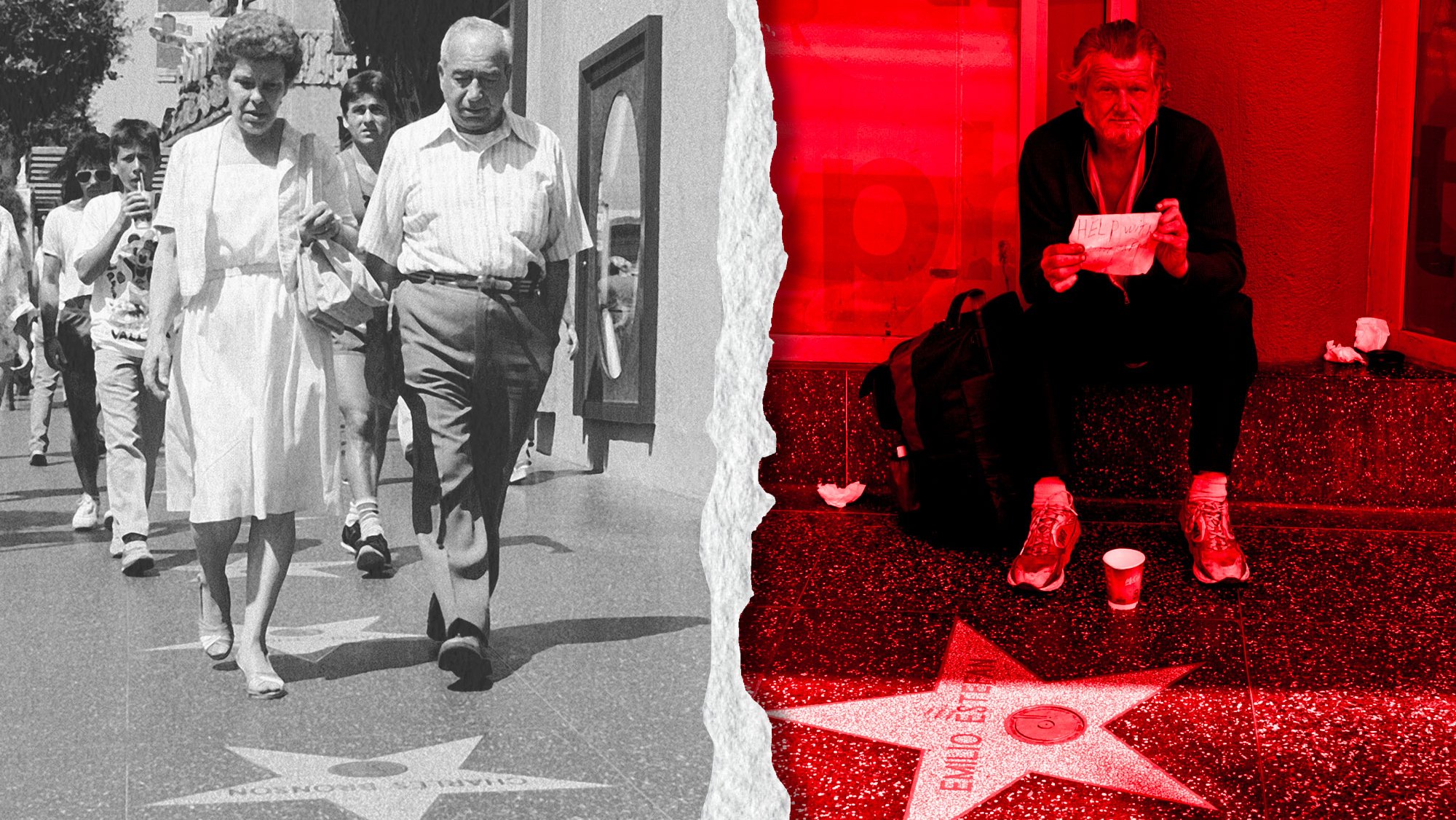Entertainment
Hollywood Faces Decline as Tourism and Industry Shift

Hollywood Boulevard, once a symbol of glamour and the heart of the film industry, is now struggling to maintain its allure. As traditional entertainment faces significant changes, the famous stretch in Los Angeles has seen a dramatic decline in tourism and foot traffic, raising questions about its future.
The 1920s marked a golden era for Hollywood as the film industry flourished and the area became a bustling destination for aspiring stars. Iconic venues like the Hollywood Roosevelt Hotel hosted the first Academy Awards, and numerous hotels, theaters, and boutiques lined the streets. However, the vibrancy of that era has largely faded. The Hollywood & Highland shopping center, which opened in 2001, was intended to rejuvenate the area but has failed to restore its former glory. The Academy Awards relocated to the Dolby Theatre in 2002, but even this prestigious event could not revive Hollywood’s lost charm.
Today, many Angelenos visit Hollywood only occasionally, often for nostalgic reasons. A recent visit revealed a stark contrast between the past and present. The Walk of Fame, featuring stars such as Michael Jackson and Jennifer Aniston, attracted photo-seeking tourists, yet many visitors struggled to recognize the names of earlier stars like Audie Murphy. The once-celebrated streets are now filled with a sense of neglect and discomfort, making it difficult to see what draws people to the area.
According to the Hollywood Partnership, foot traffic in the entertainment district has plummeted by about 50 percent over the past year and has not rebounded to pre-pandemic levels. The district’s decline has significant implications for Los Angeles, which has long relied on Hollywood to generate billions in tourism revenue. The area’s declining appeal is evident, with few attractions and a growing number of unsightly sights, such as impersonators and struggling businesses.
The changing landscape of media and entertainment raises the question: as traditional film and television stars fade from the spotlight, will new media celebrities like MrBeast and Bella Poarch take their place? While their influence grows, it appears unlikely that Hollywood will remain their home. The allure of the area is diminishing, as many wonder what tourists are seeking when they arrive.
Challenges in the entertainment industry, including a prolonged strike by SAG-AFTRA and the Writers Guild of America (WGA), alongside increasing layoffs and studio consolidations, have compounded Hollywood’s struggles. The pandemic initiated a seismic shift, prompting people to reconsider their ties to the area. As John Terzian, co-owner of The h.wood Group, observes, “You don’t have to live here to be in Hollywood.”
Despite the challenges, Terzian believes in the resilience of Los Angeles. He notes that the city is going through a rough patch that is experienced in urban areas worldwide, including Miami, New York, and London. The ongoing struggles of cities post-pandemic do not diminish Los Angeles’s status or potential.
Historian and professor Eric Avila highlights that the decline of Hollywood has historical roots, with changes in film production patterns since the late 1960s and 1970s. As studios relocated, the neighborhood transformed, losing its glitz and becoming less appealing to both residents and visitors. Avila emphasizes that Hollywood is not synonymous with Los Angeles, as the city has diversified its economy beyond entertainment.
Real estate developer Leo Pustilnikov reflects on failed revitalization efforts like the Hollywood & Highland center, which promised a renaissance but fell short. The economic downturn in Hollywood may reflect broader changes in the industry, but the city has additional strengths. Other sectors, such as education, healthcare, and hospitality, outpace entertainment in providing jobs.
The evolution of Los Angeles is ongoing, and those who cling to the past may hinder future growth. Avila notes that the city’s identity has always been fluid, with Hollywood serving as a significant cultural force that has not remained constant. The transformation from barley fields to the epicenter of global media production was rapid; similarly, the future of Hollywood may evolve in unexpected ways.
As Hollywood Boulevard grapples with its identity, the past may fade, but new opportunities and attractions will likely emerge. The city has a rich history of reinvention, and the next chapter may redefine what it means to be Hollywood, ensuring that the area remains a vibrant part of Los Angeles’s ever-changing narrative.
-

 Health2 weeks ago
Health2 weeks agoInnovative Surgery Restores Confidence for Breast Cancer Patients
-

 Top Stories2 weeks ago
Top Stories2 weeks agoMarc Buoniconti’s Legacy: 40 Years Later, Lives Transformed
-

 Sports4 weeks ago
Sports4 weeks agoSteve Kerr Supports Jonathan Kuminga After Ejection in Preseason Game
-

 Science4 weeks ago
Science4 weeks agoChicago’s Viral ‘Rat Hole’ Likely Created by Squirrel, Study Reveals
-

 Politics4 weeks ago
Politics4 weeks agoDallin H. Oaks Assumes Leadership of Latter-day Saints Church
-

 Entertainment4 weeks ago
Entertainment4 weeks agoZoe Saldana Advocates for James Cameron’s Avatar Documentary
-

 Business4 weeks ago
Business4 weeks agoTyler Technologies Set to Reveal Q3 2025 Earnings on October 22
-

 Lifestyle4 weeks ago
Lifestyle4 weeks agoKelsea Ballerini Launches ‘Burn the Baggage’ Candle with Ranger Station
-

 Business3 weeks ago
Business3 weeks agoZacks Research Downgrades Equinox Gold to Strong Sell Rating
-

 Top Stories2 weeks ago
Top Stories2 weeks agoBOYNEXTDOOR’s Jaehyun Faces Backlash Amid BTS-TWICE Controversy
-

 Health2 weeks ago
Health2 weeks ago13-Year-Old Hospitalized After Swallowing 100 Magnets
-

 Lifestyle4 weeks ago
Lifestyle4 weeks agoDua Lipa Celebrates Passing GCSE Spanish During World Tour









